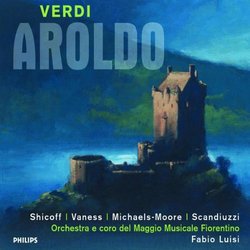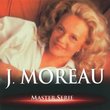| All Artists: Giuseppe Verdi, Fabio Luisi, Orchestra del Maggio Musicale Fiorentino, Neil Shicoff, Carol Vaness, Julian Gavin, Roberto Scandiuzzi, Marina Comparato, Anthony Michaels-Moore, Sergio Spina Title: Verdi: Aroldo Members Wishing: 1 Total Copies: 0 Label: Philips Original Release Date: 1/1/2001 Re-Release Date: 11/13/2001 Genre: Classical Styles: Opera & Classical Vocal, Historical Periods, Classical (c.1770-1830) Number of Discs: 2 SwapaCD Credits: 2 UPC: 028946251225 |
Search - Giuseppe Verdi, Fabio Luisi, Orchestra del Maggio Musicale Fiorentino :: Verdi: Aroldo
 | Giuseppe Verdi, Fabio Luisi, Orchestra del Maggio Musicale Fiorentino Verdi: Aroldo Genre: Classical |
Larger Image |
CD DetailsSimilar CDs |
CD ReviewsA Sonically Spellbinding Effort John G. Gleeson Sr. | Frederic, Mi USA | 11/26/2001 (5 out of 5 stars) "Since the early/mid-1980's, Philips has produced about a dozen of Verdi's early and lesser known operas. The company has treated them to first-rate casts and conductors, and the results should be in every opera lover's CD library. Younger Verdians will not recall that in the stereo LP era, only a handful of Verdi's operas were available, and even those had "traditional cuts" that eliminated parts that critics felt distracted from the dramatic movement within the work. Philips now closes the circle with Aroldo, which was recorded by CBS several years ago, but with nowhere near the impact of this recording. First and foremost, this is a gloriously sung opera! Carol Vaness is meltingly lyrical, yet brings the dramatic intensity of the troubled Mina clearly into focus. How great it is to hear Neil Shicoff in such splendid voice again, after his absence from the stage. He is the Verdian spinto tenor at its best! Baritone Anthony Michaels-Moore, who I experienced for the first time in this performance is also excellent, although his top gets a bit unfocused on occasion. Fabio Luisi conducts with discipline and brio, as he does on the recently released Jerusalem and Alzira (both from Philips, and both splendidly sung and conducted). Anyone who has been misled into thinking that Verdi wrote nothing of substance before Rigoletto, should have this work FedEx'd to the CD player. And for the history buffs, read Julian Budden's notes on why Stiffelio (from which Aroldo was developed) is better dramatically, but Aroldo is superior musically. By the way, while we have gotten accustomed to digital sound, this performance is stunning. Enjoy!" Some fine things but more for the Verdi completist Ralph Moore | Bishop's Stortford, UK | 07/08/2010 (4 out of 5 stars) "As a longtime Verdi lover, I cannot be as enthusiastic about this recording as the previous Amazon.com reviewer. Yes, there are many fine things in it - how could it be otherwise when the Verdi of 1857 was adapting a work originally staged in 1850 as "Stiffelio"? - but those fine things are mostly preserved in the original, and the reworking represents a very uneasy and patchy compromise of the kind that the principled but pragmatic Verdi occasionally felt obliged to engineer. There is, however, enough new music - additonal arias and the substitution of an entire last scene - to make "Aroldo" virtually a different entity from "Stiffelio", at least from the completist's point of view.
The recasting of the original plot in Norman England of 1200 - a haven safe from the censors' prudery - makes an absurdity of Aroldo's character and motivation and you could read more of this in Julian Budden's excellent introduction. I can live with this for the sake of the music but it makes sympathy, empathy and credibility an issue, especially when none of the singers here approaches the vocal beauty and emotional truth of the cast in the superb 1975 Philips recording of the parent opera, "Stiffelio", more idiomatically and responsively conducted by Gardelli. I find Luisi rather dutiful and a bit slack at times when more tension is required and none of the principals in "Aroldo" can hold a candle to the tream of Carreras, Sass and Manuguerra. Shicoff's tight, nasal, "ingolata" production and tendency to bleat is less than attractive, although he is suitably impassioned. Vaness, too, is a fine vocal actress but the shrill, flapping top can be grating. Michaels-Moore's cloudy, ill-centred baritone is not a Verdi voice, and as I discovered when I saw him perform Scarpia recently, he cannot really suggest malice or fervour with his gentle, grey, English tone and windy top notes. The bass Scandiuzzi is already sounding bluff and rocky; his career nose-dived shortly after this recording. So all in all, for me the singers leave something to be desired, as much as I admire their commitment. That new last scene is interesting. As Budden points out, it clearly marks a departure from the rest of the score, belonging to Verdi's late-middle-period oeuvre; the sound world is much more that of "Forza", using Romantic scenery of the "sublime" nature in the moonlit valley of Loch Lomond and the standard operatic cast of shepherds, hunters, harvesters and hermits, all with voices uplifted in a fervent prayer which is immediately succeeded by a storm proleptic of the openingof "Otello". All of this creates a sense of time and space as specific human events are played out against the backdrop of universal archetypes. This last scene could constitute justification alone for buying the set. The dénouement is inevitably less moving than the "coup de théâtre" which conclude "Stiffelio". I hesitated to give it four stars, inclining to three, but it doesn't do to be niggardly in this time of a dearth and there is much to enjoy here." |

